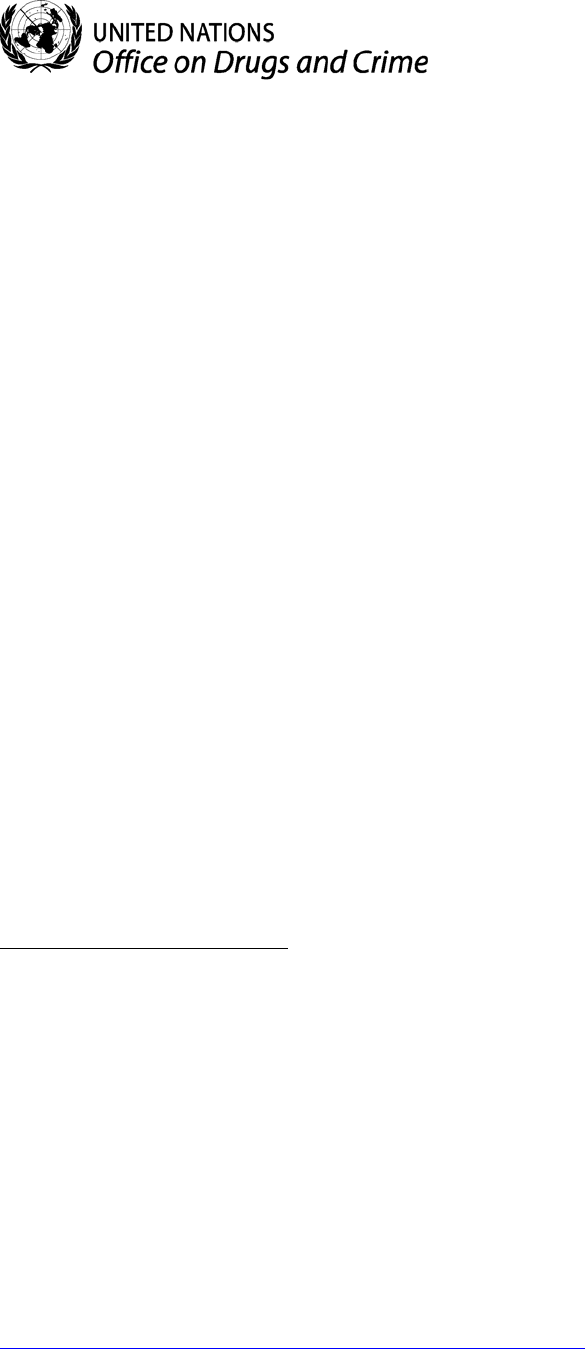
1
MODEL LAW ON MUTUAL
ASSISTANCE IN CRIMINAL
MATTERS
(2007)
1
1
Elaborated in the Vienna based United Nations Office on Drugs and Crime, Division for Treaty
Affairs, Treaty and Legal Affairs Branch (UNODC/DTA/TLAB) in accordance with General
Assembly resolution 53/112 of 9 December 1998. Earlier drafts of the model law were reviewed in two
Expert Group Meetings on the Elaboration of Model Legislation on Mutual Legal Assistance,
organized by the United Nations Office on Drugs and Crime, in cooperation with the International
Institute of Higher Studies in Criminal Sciences (ISISC), and hosted by ISISC in Siracusa, Italy, on 30
November-3 December 2004 and 28-29 November 2005 respectively. A revised draft version, based on
the comments received by the experts, was distributed as a Conference Room Paper
(E/CN.15/2006/CRP.4) at the fifteenth session of the Commission on Crime Prevention and Criminal
Justice (Vienna, 24-28 April 2006) and Member States were invited to provide further comments by 30
July 2006. Input and remarks received upon this invitation are reflected in the final version of the
model law which was made available in February 2007. Footnotes accompanying the text of the law
intend to provide specific guidelines on drafting or amending national mutual legal assistance
legislation, which are reflecting similar (and accordingly adapted) guidance included in the Revised
Manual on the Model Treaty on Mutual Assistance in Criminal Matters, available on the UNODC
website through the following weblink:
http://www.unodc.org/pdf/model_treaty_extradition_revised_manual.pdf
.

2
CONTENTS
CHAPTER 1: PRELIMINARY
Section 1: Short title and commencement
Section 2: Definitions
Section 3: Objects of the Act
Section 4: Saving clause
Section 5: Central authority: making and reception of requests
Section 6: Spontaneous transmission of information
CHAPTER 2
: INCOMING REQUESTS FOR ASSISTANCE
Part 1: General provisions
Section 7: Scope of assistance
Section 8: Form of request
Section 9: Content of request for assistance
Section 10: Application of specific procedures sought by the requesting State
Section 11: General provision
Section 12: Refusal of request for assistance
Section 13: Non-disclosure of confidential requests for assistance
Part 2: Rules regarding specific forms of assistance
Section 14: Statements, testimony, production of evidence and identification of a
person or thing
Section 15: Special provisions relating to the taking of testimony or statements
Section 16: Use of videoconferencing technology
Section 17: Search and seizure
Section 18: Transfer of a person detained in (name of State).
Section 19: Safe conduct.
Section 20: Effect of transfer on sentence of person in custody.
Section 21: Custody of persons in transit.
Part 3: Requests for freezing or seizure and confiscation
Section 22: Definitions
Section 23: Request for obtaining an order for freezing or seizure
Section 24: Request for enforcement of foreign orders
Section 25: Rights of bona fide third parties
Section 26: Disposition of confiscated proceeds of crime or property
Part 4: Assistance in relation to computers, computer systems and computer
data
Section 27: Definitions

3
Section 28: Expedited preservation and disclosure of stored computer data
Section 29: Production of stored computer data
Section 30: Search and seizure of computer data
CHAPTER 3: REQUESTS FOR ASSISTANCE BY (NAME OF STATE)
Section 31: Special provisions relating to transferred persons in custody
Section 32: Safe conduct for person in (name of State) pursuant to a request for
assistance
Section 33: Limitation on use of evidence obtained pursuant to a request for
assistance
Section 34: Suspension of time limits pending execution of a request for assistance
CHAPTER 4: MISCELLANEOUS
Section 35: Costs

4
CHAPTER 1: PRELIMINARY
1. Short title and commencement
2
(1) This law may be called the “Mutual Assistance in Criminal Matters Act 2005”.
(2) This Act shall come into force on……
2. Definitions
3
In this Act, unless otherwise specifically provided:
(1) Agreement means a treaty, convention or other international agreement that is in
force, to which (name of State) is a party and that contains a provision or provisions
respecting mutual assistance in criminal matters.
(2) Central authority means an authority designated in section 4 of this Act.
(3) Criminal matter includes any investigation, prosecution or judicial proceeding
relating to:
(a) any criminal offence; or
(b) the determination of whether property is proceeds or instrumentalities of
crime or terrorist property;
(c) a possible confiscation order, whether or not based on an underlying
criminal conviction; or
(d) the freezing or seizure of proceeds or instrumentalities of crime or terrorist
property;
[or
(e) an investigation carried out by an administrative investigative body with a
view to referral for prosecution under the criminal law]
4
.
[(4) International Criminal Court means the Court established by the Rome Statute
of the International Criminal Court that was adopted by the United Nations
Diplomatic Conference of Plenipotentiaries on the “Establishment of an International
Criminal Court” on 17 July 1998 and came into force on 1 July 2002.]
5
2
States that wish to retain this provision, especially those of a civil law tradition, may wish to place
this provision at the end of their legislation.
3
States, especially those of a civil law tradition, may wish to place the definition section at the end of
their legislation.
4
The clause in brackets is optional, as a number of countries may not wish to include administrative
proceedings in this definition.
5
This definition will only be relevant for States that are either States parties to the Rome Statute of the
International Criminal Court (adopted by the United Nations Diplomatic Conference of
Plenipotentiaries on the “Establishment of an International Criminal Court” on 17 July 1998 and in
force since 1 July 2002), or are non States parties that wish to have the ability to provide for assistance
to the ICC under general mutual legal assistance legislation. See section
7(4) below.

5
[3. Objects of the Act
6
7
(1) The object of this Act is to facilitate the widest range of assistance to be given and
received by (name of State) in investigations, prosecutions and judicial proceedings
in relation to criminal matters, including with respect to the freezing, seizing and
confiscation of proceeds and instrumentalities of crime and terrorist property.
(2) Nothing in the Act precludes the granting of any other form or nature of assistance
that may lawfully be afforded to foreign States, including controlled delivery, joint
investigations, the use of other special investigative techniques and the transfer of
criminal proceedings.]
4. Saving clause
8
Nothing in this Act shall limit the power of a competent authority of (name of State)
apart from this Act to make or receive requests for information or to cooperate with a
foreign State through other channels or in another manner.
5. Central authority: making and reception of requests
(1) For the purposes of this Act a central authority is established with the tasks:
(a) to make and receive requests for assistance and to execute and/or arrange for
the execution of such requests;
(b) where necessary, to certify or authenticate, or arrange for the certification and
authentication of, any documents or other material supplied in response to a
request for assistance;
(c) to take practical measures to facilitate the orderly and rapid disposition of
requests for assistance;
(d) to negotiate and agree on conditions related to requests for assistance, as well
as to ensure compliance with those conditions;
6
This section is optional as not all countries have an objects clause in their legislation. However, States
are exhorted to include some expression of the sentiment of the widest range of assistance within the
usual format of their legislation.
7
States may wish to include in their mutual legal assistance legislation a section listing the types of
assistance to be afforded to a foreign State. Such a provision was not included in the model law on the
understanding that it may be considered by other countries as a limitation to cooperation even if a
“catch all” reference (“any other type of assistance that is not contrary to the domestic law”) is inserted.
For countries wishing to provide for a list of types of assistance, the following could be used as
reference material: article 1, paragraph 2 of the Model Treaty on Mutual Assistance in Criminal
Matters; article 18, paragraph 3 of the United Nations Convention against Transnational Organized
Crime; and article 46, paragraph 3 of the United Nations Convention against Corruption.
8
For the application of Section 4: Saving Clause, paragraphs 63-66 of the Revised Manual on the
Model Treaty on Mutual Assistance in Criminal Matters
(http://www.unodc.org/pdf/model_treaty_extradition_revised_manual.pdf) may also be considered
mutatis mutandis as references.

6
(e) to make any arrangements deemed necessary in order to transmit the
evidentiary material gathered in response to a request for assistance to the
competent authority of the requesting State or to authorize any other authority to
do so; and
(f) to carry out such other tasks as provided for by this Act or which may be
necessary for effective assistance to be provided or received.
(2) The central authority referred to in this section shall be the [designate appropriate
authority/office, e.g. Minister of Justice/Ministry of Justice/Attorney-
General/Procurator General] of (name of State).
(3) Requests transmitted to other agencies or authorities of (name of State) shall be
referred as soon as possible to the central authority. The fact that the central authority
of (name of State) did not receive the request directly from the foreign State shall not
affect the validity of the request or action taken on it. The judicial authority of (name
of State) may not reject the request on the grounds that the central authority did not
receive it directly from the foreign State.
6. Spontaneous transmission of information
Nothing in this Act shall prevent the central authority of (name of State), or any other
competent authority of (name of State), from spontaneously transmitting information
relating to criminal matters to a competent authority in a foreign State without prior
request.
CHAPTER 2: INCOMING REQUESTS FOR ASSISTANCE
Part 1: General provisions
7. Scope of assistance
9
(1) Assistance under this Act may be provided to any foreign State whether on the
basis of an agreement or not.
(2) This Act regulates the rendering of assistance by (name of State) to any foreign
State, unless otherwise regulated by agreement.
(3) Notwithstanding subsection (2), nothing precludes (name of State) from
rendering of a broader range of assistance to another State under this Act than may be
provided for in an agreement.
9
See also paragraphs 10-62 of the Revised Manual on the Model Treaty on Mutual Assistance in
Criminal Matters.

7
(4) The provisions of this Act shall also apply to a request for assistance from the
International Criminal Court or an international tribunal [listed in the schedule to this
Act]
10
.
8. Form of request
(1) The central authority of (name of State) may accept a request for assistance from
a foreign State by any means of communication that affords a record in writing
including, but not limited to, by facsimile or e-mail.
(2) In urgent cases, the central authority of (name of State) may accept an oral
request provided it is confirmed by a means that affords a record within [x]
days/hours.
9. Content of request for assistance
11
(1) A request for assistance shall include:
(a) the name of the authority conducting the investigation, prosecution or
judicial proceeding to which the request relates, including contact details
of the person capable of responding to enquiries concerning the request;
(b) a description of the criminal matter, including a summary of the facts and,
if applicable, offences and penalties concerned;
(c) a description of the purposes of the request for assistance, as well as the
nature of the assistance sought.
(2) If the information set forth in subsection (1) is not sufficient, (name of State)
may request the foreign state to provide additional information.
(3) Notwithstanding subsection (1), the fact that a request for assistance does not
contain the information set out therein shall not affect the validity of the request or
preclude its execution.
10. Application of specific procedures sought by the requesting State
12
(1) A request for assistance shall be executed in accordance with any procedures
specified in the request, unless such execution would be contrary to the fundamental
principles of the law of (name of state).
10
The bracketed phrase in this subsection can be deleted where States may wish to include requests for
assistance from all international tribunals in the scope of application of their legislation.
11
See also paragraphs 105-115 of the Revised Manual on the Model Treaty on Mutual Assistance in
Criminal Matters.
12
See also paragraphs 116-125 of the Revised Manual on the Model Treaty on Mutual Assistance in
Criminal Matters.

8
(2) For greater certainty, subsection (1) shall apply even if the requested procedures
are not used in (name of State) or are not available in relation to the type of
assistance sought domestically.
11. General provision
If a foreign State requests a form of assistance not specifically mentioned in this
Chapter but available under the law of (name of State) for domestic criminal matters,
the assistance sought may be provided to the same extent and under the same
conditions as would be available to law enforcement authorities of (name of State) in
a domestic criminal matter.
12. Refusal of request for assistance
Option 1
No reference to grounds for refusal of a mutual legal assistance request.
13
Option 2
(1) A request for assistance under this Act may be refused if, in the opinion of [the
central authority of]
14
(name of State), granting of the request would prejudice the
sovereignty, security, ordre public or other essential public interests of (name of
State).
(1) or (2)
15
Notwithstanding subsection (1) or the provisions of any other law of
(name of State), assistance under this Act shall not be refused:
(a) on the ground of bank secrecy; or
(b) on the sole ground that the offence for which such assistance is sought is
also considered to involve fiscal matters.
(2) or (3) Reasons shall be provided for any refusal of a request for assistance.
(3) or (4) Where possible, the central authority of (name of State) may, instead of
refusing a request, grant assistance subject to such conditions, including but not
limited to use limitations, as may be appropriate in a particular case.
13
As the rendering of assistance is a discretionary matter, there is no need to list specific grounds on
which a request might be refused. This approach also gives a State great flexibility in negotiating the
provisions of a treaty without conflict with domestic law. Discretion to refuse assistance should be
exercised with restraint in order to facilitate greater reciprocal cooperation by other States. If the
volume of incoming requests begins to impose extraordinary burdens on the requested State, that State
should consult with requesting States to identify measures that can reduce pending and future burdens.
14
States may vest the authority to make these decisions in the central authority or in some other office,
person or body.
15
Numbering will depend on the option chosen.

9
(4) or (5) Once the conditions have been accepted to the satisfaction of the central
authority of (name of State), it may transmit the results of the execution of the
request.
13. Non-disclosure of confidential requests for assistance
16
(1) Unless otherwise authorized by law, a person who, because of his or her official
capacity or office, and being aware of the confidential nature of the request, has
knowledge of:
(a) the contents of such request made under this Act; or
(b) the fact that such request has been, or is about to be, made; or
(c) the fact that such request has been granted or refused;
shall not disclose those contents or these facts except to the extent that the disclosure
is necessary to execute the foreign request.
[(2) Any person who contravenes subsection (1) commits an offence and is
liable to (sentence).]
17
(3) The [court/prosecutor/other authority] issuing an order under sections (14), (17)-
(18), (23)-(24) and (29)-(30) may order the person providing a statement or testimony,
or the custodian of evidence or information being provided under this Act, to keep
confidential the fact of having given such statement or testimony, or having produced
such evidence or information. [The failure to respect such order is liable to
(sentence)]
18
.
Part 2: Rules regarding specific forms of assistance
14. Statements, testimony, production of evidence and identification of a person
or thing
(1) Where a request is made by a foreign State for
(a) the taking of a statement or testimony from a person; or
(b) the production of documentary or other evidence in (name of State); or
(c) the identification of a person or thing,
16
See also paragraphs 134-140 of the Revised Manual on the Model Treaty on Mutual Assistance in
Criminal Matters.
17
Subsection (2) is optional, as related issues may be covered by general provisions on contempt of
court.
18
See footnote 17 above.

10
the [court/prosecutor/other authority] may issue an order for gathering evidence if
satisfied that [there are reasonable grounds to (believe/suspect) that]
19
the relevant
evidence may be found in (name of State).
(2) Such order shall specify the procedure by which the evidentiary material is to be
gathered to give effect to the foreign request and may include such conditions as are
considered appropriate, including conditions:
(a) relating to the interests of the person named therein or of third parties; or
(b) requiring a person to appear at a specified time and place for an
examination or to produce documents or things; or
(c) designating a person before whom an examination will take place; or
(d) requiring a person to appear at a facility where technology for video or
satellite link is available; or
(e) providing for the non disclosure of information regarding the request and
its execution.
20
(3) A person who, without reasonable excuse, refuses to comply with an order issued
by a [court/prosecutor/other authority] in accordance with subsection (1) shall be
liable to sanction available under the laws of (name of State).
(4) This Section is without prejudice to the ability of (name of State) to obtain the
evidence sought through voluntary production of the documentary of other evidence
or provision of a voluntary statement or testimony.
15. Special provisions relating to the taking of testimony or statements
(1) Where the evidence sought under section (14) is a statement or testimony from a
witness, including an expert or defendant where applicable, the
[court/prosecutor/other authority] of (name of State) may permit:
(a) any person to whom the foreign investigation, prosecution or proceeding
relates or that person’s legal representative; or
(b) the legal representative of the foreign State
to participate in the proceedings and question the witness.
(2) A person named in an order issued under section (14) is entitled to be paid the
expenses he or she would be entitled to if required to attend as a witness in
proceedings in (name of State).
19
The phrase in brackets is intended to cover the practice followed in common law jurisdictions.
20
This clause should cover the issue of ordering private persons not to disclose information.

11
(3)
21
A person named in the order may refuse to answer a question or to produce any
other evidentiary material where the refusal is based on:
(a) a law currently in force in (name of State), except where this
law provides otherwise;
(b) a privilege recognized by a law in force in the requesting State;
(c) a law currently in force in the requesting State that would
render the answering of that question or the production of the
evidentiary material by that person in its own jurisdiction an
offence.
(4) If requiring the person to answer the question might result in a breach of law of
the requesting State in accordance with subsection 3(c) or be contrary to the
fundamental purpose of a privilege recognized in the requesting State in accordance
with subsection 3(b), the [court/prosecutor/other authority] may permit the refusal on
a temporary basis, make a note of it and continue with the examination. At the end of
the examination, the record of it with any such noted objection(s) shall be submitted
to the requesting state. If the authorities of the requesting State determine any such
noted objection(s) to be unfounded, they shall advise the central authority [or other
competent authority] of (name of State), the proceedings shall be resumed and the
witness shall be required to answer the question.
16. Use of videoconferencing technology
22
23
(1) The [court/prosecutor/other authority] of (name of State) may issue an order that
the testimony or statement, the identification of a person or thing or any other form of
assistance be provided by use of video or audio transmission technology.
(2) An order issued under subsection (1) shall order the person:
(a) to attend at a time and place fixed by the [court/prosecutor/other authority]
to give a statement, testify or otherwise provide assistance by videoconference,
and to remain in attendance until excused by the authorities of the foreign
State;
(b) to answer any questions raised by the authorities of the foreign State, or persons
authorized by those authorities, in accordance with the law that applies to that foreign
State;
21
See also paragraph 151 of the Revised Manual on the Model Treaty on Mutual Assistance in
Criminal Matters.
22
Countries wishing to include in their legislation more detailed provisions on this issue may take into
consideration the relevant articles of the European Union Convention on Mutual Assistance in Criminal
Matters (2000) and the Second Additional Protocol to the Council of Europe Convention on Mutual
Assistance in Criminal Matters (2001).
23
See also paragraph 148 of the Revised Manual on the Model Treaty on Mutual Assistance in
Criminal Matters.

12
(c) to produce or show to those authorities at the time and place fixed by the
[court/prosecutor/other authority] any item, including any document, or copy
thereof
and may include any other appropriate conditions.
(3) Notwithstanding the provisions of section (35), the costs of establishing a video or
telephone link, costs related to the servicing of a video or telephone link in (name of
State), shall be borne by the requesting State, unless otherwise agreed.
17. Search and seizure
24
(1) Where a request is made by a foreign State for search and seizure to be carried out
in (name of State), the [court/prosecutor/other authority] of (name of State) may
issue an [order to search/search warrant/other order] if satisfied that [there are
reasonable grounds to (believe/suspect) that] evidence relevant [and proportionate] to
the investigation, prosecution or proceeding may be found in (name of State).
(2) The procedures for the execution of the [order to search/search warrant/other
order] shall be the same as those for the execution of an [order to search/search
warrant/other order] in (name of State), varied to the extent necessary to respond to
the request.
(3) In issuing the [order to search/search warrant/other order] in accordance with
subsection (1), the [court/prosecutor/other authority] of (name of State) may subject
its execution to conditions and may authorize the presence and participation of
officers of the foreign State in the search.
18. Transfer of a person detained in (name of State)
25
(1) Where a foreign State requests the attendance of a person in custody in its territory
for purposes of identification, giving evidence or otherwise providing assistance, the
[court/prosecutor/other authority] may issue an [order/warrant] and direct that the
person in custody be placed in the custody of an authorized officer for the purpose of
giving the assistance requested, if satisfied that:
(a) the person in custody has consented to attending; and
(b) the foreign State has given assurances satisfying the requirements set out in
section 19.
24
See also paragraphs 168-170 of the Revised Manual on the Model Treaty on Mutual Assistance in
Criminal Matters.
25
See also paragraphs 152-154 of the Revised Manual on the Model Treaty on Mutual Assistance in
Criminal Matters.

13
(2) Where an [order/warrant] is issued in accordance with subsection (1), the central
authority of (name of State) may make the necessary arrangements for the travel of
the person in custody to the foreign State.
19. Safe conduct
26
(1) The matters in relation to which assurances are to be given for the purposes of
section 18 are:
(a) In all cases:
(i) That the person shall not be detained, prosecuted or
punished or subjected to any other restriction of
personal liberty or subjected to any civil proceedings, in
respect of any act or omission that occurred before the
person’s departure from (name of State);
(ii) That the person shall not be required, without his/her
consent and the consent of (name of State), to assist in
any investigation or proceeding other than that to which
the request relates;
(iii) That the person shall be returned to (name of State) in
accordance with the arrangements made or varied with
the central authority of (name of State).
(b) Where (name of State) requires the foreign State to keep the person in
custody while that person is in the territory of the State:
(i) That adequate arrangements are made for that purpose;
(ii) That the person shall not be released from custody by the
foreign State, unless (name of State) notifies that the person is
entitled to be released from custody under the law of (name of
State).
(2) The (name of State) may also require the requesting State to give the assurances
set forth in subsection (1)(a) in case of a person not in custody.
20. Effect of transfer on sentence of person in custody
Where a person in custody who is serving a term of imprisonment [or is detained
pending trial] in (name of State) is transferred to a foreign State pursuant to a request
26
See also paragraphs 160-164 of the Revised Manual on the Model Treaty on Mutual Assistance in
Criminal Matters.

14
made under section 18, the time spent in custody in the foreign State shall count as
part of any sentence required to be served by that person in custody.
21. Custody of persons in transit
(1) Where a person is to be transferred in custody from a foreign State (transferring
State) to another foreign State (receiving State) through (name of State) for purposes
of identification, giving evidence or otherwise providing assistance,
Option 1
27
the central authority of (name of State) may authorize the transit and apply to a
[court/prosecutor/other authority] for the issuance of an [order/warrant] to that effect.
The [court/prosecutor/other authority] shall issue an [order/warrant] to enable the
transportation of the person through (name of State) and the holding of that person in
custody by authorities of the transferring State.
Option 2
28
the central authority of (name of State) may approve the transportation of the person
through (name of State) and the holding of that person in custody by authorities of
the transferring State.
(2) Where an unscheduled transit in (name of State) occurs, a competent authority of
(name of State) may, at the request of the escorting officer, hold the person in
custody for [24/48 hours] pending an authorization under subsection (1).
Part 3: Requests for freezing or seizure and confiscation
29
22. Definitions
For the purposes of this Act:
(1) Assets include items.
(2) Confiscation, which includes forfeiture where applicable, means the permanent
deprivation of property by order of a court or other competent authority.
(3) Confiscation order means an order made by a court or other competent authority
in (name of State) or a foreign State for the confiscation of proceeds or
instrumentalities of crime or terrorist property. Such an order includes a pecuniary
27
For national laws requiring judicial approval for granting transit permission.
28
For national laws that regulate the granting of transit permission as an administrative practice.
29
See also paragraphs 171-207 of the Revised Manual on the Model Treaty on Mutual Assistance in
Criminal Matters.

15
penalty or other order imposing a penalty determined by reference to the benefit to a
person from an offence or unlawful activity
30
, whether or not the order is based on an
underlying criminal conviction.
(4) Instrumentalities of crime mean any property:
(a) used in, or in connection with, the commission of an offence or unlawful
activity; or
(b) intended to be used in, or in connection with, the commission of an
offence or unlawful activity;
whether the property is located, or the offence or unlawful activity is committed,
within or outside (name of State).
(5) Proceeds of crime mean any property derived from or obtained, directly or
indirectly, through the commission of an offence or unlawful activity, whether such
property is located, or the offence is committed, within or outside (name of State).
(6) Property means assets of every kind, whether corporeal or incorporeal, movable or
immovable, tangible or intangible, and legal documents or instruments evidencing
title to, or interest in, such assets.
(7) Freezing or seizure means temporarily prohibiting the transfer, conversion,
disposition or movement of property or temporarily assuming custody or control of
property on the basis of an order issued by a court or other competent authority and
includes a restraining order.
(8) Terrorist property means:
(a) any property used in, to be used, in full or in part, in or derived from:
i) an act which constitutes an offence as defined in the 13 international
counter-terrorism instruments listed in the schedule to this Act; or
ii) any act proscribed as a terrorist act under the law of (name of State) or
of a foreign State.
(b) any property required to be frozen by resolutions of the Security Council
exercising its powers under Chapter VII of the Charter of the United Nations;
(c) property of any individual or organization proscribed as terrorist by the (name
of State) or a foreign State.
23. Request for obtaining an order for freezing or seizure
Where a request is made by a foreign State for the freezing or seizure of property as
proceeds or instrumentalities or terrorist property, the [court/prosecutor/other
authority] of (name of State) may issue a freezing or seizure order if satisfied that
there is a sufficient basis to obtain such an order under the law(s) of (name of State),
30
Reference in the definitions to offence or unlawful activity takes account of the fact that in some
States’ legislation, especially non-conviction-based confiscation regimes, proceeds of crime are
premised on unlawful activity.

16
which shall apply as if the offence or unlawful activity that is the subject of the order
had been committed in (name of State).
24. Request for enforcement of foreign orders
Option 1
31
(1) Where a request is made by a foreign State for the enforcement of a
freezing/seizure or confiscation order and there are reasonable grounds for believing
that all or some of that property is located in the territory of (name of State), the
[court/prosecutor/other authority] of (name of State) may issue an order for the:
(a) registration of the foreign freezing or seizure order if satisfied that the
order is in force in the foreign State at the time of the application;
(b) registration of the foreign confiscation order if satisfied that the order
is in force in the foreign State at the time of the application and is not
subject to appeal.
(2) A copy of any amendments to the order may be registered in the same manner as
the order and shall take effect upon registration.
(3) The [court/prosecutor/other authority] of (name of State) shall cancel the
registration of:
(a) a foreign freezing or seizure order, if satisfied that the order has ceased to
have effect; or
(b) a foreign confiscation order if satisfied that the order has been satisfied or
has ceased to have effect.
(4) An order and any amendments thereto registered under this section may be
enforced as if they were issued under the law of (name of State).
Option 2
32
(1) Where a request is made by a foreign State for the enforcement of a
freezing/seizure or confiscation order and there are reasonable grounds for believing
that all or some of that property is located in the territory of (name of State), the
[competent authority] may file a copy of the order with [relevant court] if satisfied
that:
(a) In the case of an order for freezing/seizure, the order is in force in the
requesting state at the time of filing;
31
For national laws requiring judicial approval for the enforcement of foreign orders.
32
For national laws that regulate the enforcement of foreign orders via the mechanism of the
registration of such orders.

17
(b) In the case of an order for confiscation, the order is in force and not subject
to further appeal at the time of filing.
(2) A copy of any amendments to the order may be filed in the same manner as the
order and shall take effect upon registration.
(3) The [competent authority] of (name of State) may cancel the registration of an
order by filing a notice to that effect if satisfied that the order has ceased to have
effect in the foreign State or, if applicable, has been satisfied.
(4) An order and any amendments filed with the court in accordance with this section
may be enforced as if they were issued under the law of (name of State).
25. Rights of bona fide third parties
(1) Notice of the [registration/filing] of an order under section 24 shall be given to all
persons appearing to have an interest in property against which the order may be
executed, prior to any execution action.
(2) Subject to subsection (4), any person with an interest in the property against which
an order [registered/filed] under section 24 may be executed, may, within 30 days of
receiving notice of the [registration/filing], make an application for an order excluding
his or her interest in the property from execution of the order. The time for bringing
the application may be extended by order of the [court/prosecutor/other authority].
(3) The provisions of the [proceeds of crime/anti-money laundering/terrorist financing
laws of (name of state)] relating to the rights of bona fide third parties shall apply,
mutatis mutandis, to any application brought under subsection (2).
(4) Unless a [court/prosecutor/other authority] in the interest of justice orders
otherwise, any person who received notice in advance of the confiscation proceedings
in the foreign State, whether participated in those proceedings or not, is precluded
from bringing an application under subsection (2).
26. Disposition of confiscated proceeds of crime or property
Upon request of a foreign State, the central authority of (name of State) may transfer
to it the whole or part of any proceeds or instrumentalities confiscated in (name of
State) in response to a request for the enforcement of a confiscation order pursuant to
section 24 of this Act.

18
Part 4: Assistance in relation to computers, computer systems and computer
data
33
27. Definitions
For the purposes of this Part:
(1) Traffic data means any computer data relating to a communication by means of a
computer system, generated by a computer system that formed a part in the chain of
communication, indicating the communication’s origin, destination, route, time, date,
size, duration or type of underlying service.
(2) Service provider means:
(a) any public or private person that provides to users of its service the ability to
communicate by means of a computer system; and
(b) any other person or entity that processes or stores computer data on behalf of
such service or users of such service.
(3) Computer data includes any representation of facts, information or concepts in a
form suitable for processing in a computer system, including a program suitable to
cause a computer system to perform a function;
(4) Computer system means any device or a group of interconnected or related
devices one or more of which, pursuant to a program, performs automatic processing
or recording of data.
(5) Subscriber information means any information contained in the form of computer
data or any other form that is held by a service provider relating to subscribers of its
services, other than traffic or content data, by which can be established:
(a) the type of communication service used, the technical provisions
relating thereto and the period of service;
(b) the subscriber’s identity, postal or other address, telephone and other
access number, billing and payment information as well as any other
information on the site of the installation of communication equipment
disclosed by or from the service agreement or arrangement.
28. Expedited preservation and disclosure of stored computer data
(1) Upon request by a foreign State setting forth the need for specified computer data
(including traffic data) to be preserved, the urgency of preserving it, sufficient
information to locate the data, and a statement that a request for production of the data
will follow, the central authority of (name of State) [or other competent authority
that can issue an expedited order] may issue an order compelling a [legal or natural]
34
person located in (name of State) to preserve and safeguard such data. The order
33
See also the provisions of the Council of Europe Convention on Cybercrime (2001).
34
This qualification of legal or natural will be unnecessary in most common law jurisdictions.

19
shall lapse if the request for production is not received within [45/60] days of the
request for preservation. Once the request for production has been received, the data
shall continue to be preserved pending resolution of the request.
(2) Where in the course of execution of a request under subsection (1) to preserve
traffic data concerning a specific communication, (name of State) discovers that a
service provider in another country was involved in the transmission of the
communication, the central authority [or other competent authority] shall have the
power to disclose to the requesting State, prior to receipt of the request for production,
a sufficient amount of the traffic data to identify that service provider and the path
through which the communication was transmitted.
35
29. Production of stored computer data
(1) Upon request of a foreign State, the [court/prosecutor/other authority] of (name of
State) may issue an order to enable the production of:
(a) specified computer data in the possession or control of a person which is
stored in a computer system or a computer data storage medium; and
(b) subscriber information in the possession or control of a service provider.
where such data or information is relevant to the criminal matter in the requesting
State.
30. Search and seizure of computer data
(1) Upon request of a foreign State, the [court/prosecutor/other authority] of (name of
State) may issue a [search warrant/order to search/other order] authorizing a person
designated by it to search or otherwise access any computer system or part thereof as
well as any computer storage medium in which computer data may be stored.
(2) The [search warrant/warrant/other order] issued pursuant to subsection (1) may
authorize the designated person, where necessary, to:
(a) seize or otherwise secure a computer system or part thereof, or a
computer data storage medium;
(b) make and retain a copy of those computer data;
(c) maintain the integrity of the relevant stored computer data; and
(d) render inaccessible or remove those computer data in the accessed
computer system.
35
This power is intended to facilitate the ability of the requesting State to make a preservation request
to the other country through which the communication travelled, before the traffic data is automatically
destroyed by the service provider pursuant to normal business practice and there is no longer the ability
to trace a communication to its source.

20
CHAPTER 3: REQUESTS FOR ASSISTANCE BY (NAME OF
STATE)
31. Special provisions relating to transferred persons in custody
36
(1) Where a person in custody in a foreign State is brought to (name of State)
pursuant to a request for assistance under this Act, that person shall:
(a) be permitted to enter and remain in (name of State) for the
purposes of the request;
(b) be required to leave (name of State) when no longer required
for those purposes; and
(c) be deemed to be in lawful custody in (name of State) for the
purposes of the request.
(2) The central authority of (name of State) shall be responsible for making any
necessary arrangements for the transfer of a person in custody in the foreign State to
(name of State), including arrangements to keep the person in custody and to return
the person to the requested State when that person’s presence is no longer required
pursuant to the request;
(3) The law(s) of (name of State) with respect to the conditions of imprisonment of
prisoners in that State, the treatment of such persons during imprisonment and the
transfer of any such prisoner from prison to prison shall apply, insofar as they are
capable of application, in relation to a person who is in (name of State) pursuant to a
request made under this section.
(4) Any person who escapes from custody while in (name of State) pursuant to a
request made under this section may be arrested without warrant and returned to the
custody authorized by this section.
32. Safe conduct for person in (name of State) pursuant to a request for
assistance
37
Option 1
(1) A person who is in (name of State) pursuant to a request for assistance under this
Act, shall not:
36
See footnote 26 above.
37
See footnote 27 above.

21
Option 2
(1) A person whose presence in (name of State) has been sought pursuant to a request
for assistance under this Act, and to whom the central authority of (name of State)
has granted safe conduct under this section, shall not:
(a) be detained, prosecuted or punished or subjected to any other restriction of
personal liberty or subjected to any civil proceedings, in respect of any act or
omission that occurred prior to that person’s departure from the foreign State
pursuant to the request;
(b) be required, without his/her consent and the consent of the foreign State, to
assist in an investigation or proceeding other than the investigation or
proceeding to which the request relates.
(2) Any safe conduct provided in accordance with subsection (1) shall cease to apply
when the person has had the opportunity to leave (name of State) and has not done so
within a period of [10/15/x] days from the date on which he/she has been informed
that his/her presence is no longer required for the purposes of the request, or when the
person has returned to (name of State).
33. Limitation on use of evidence obtained pursuant to a request for assistance
38
(1)
Option 1
Upon request of the foreign State, any evidentiary material provided to (name of
State) as a result of a request for assistance under this Act:
(a) may not be used for any purpose other than the investigation, prosecution
or judicial proceeding in respect of which the request for assistance was
made; and
(b) is inadmissible as evidence in any proceedings other than the proceedings
in respect of which it was obtained,
unless the central authority of (name of State) has approved its use for those other
purposes [or the material has been made public in the normal course of the
proceedings for which it was provided].
Option 2
The central authority of (name of State) shall have the power to enforce conditions or
limitations on use of evidence obtained pursuant to a request for assistance imposed
38
See also paragraphs 129-133 of the Revised Manual on the Model Treaty on Mutual Assistance in
Criminal Matters.

22
by the foreign State and accepted by (name of State). The courts of (name of State)
shall have the power to issue an order accordingly.
(2) The central authority of (name of State) shall not approve such other use without
consulting the foreign State which provided the evidentiary material.
[34. Suspension of time limits pending execution of a request for assistance
The statute of limitations or other time limit on bringing prosecution or enforcing a
sentence shall be suspended pending execution of a mutual assistance request made
by (name of State)]
39
.
CHAPTER 4: MISCELLANEOUS
35. Costs
40
(1) Subject to subsection (2), or unless otherwise agreed, the execution of a request
for assistance in (name of State) shall be conducted without charge to the foreign
State, except for:
(a) costs incurred by the attendance of experts in the territory of (name of
State); or
(b) costs incurred by the transfer of a person in custody; or
(c) any costs of a substantial or extraordinary nature.
(2) The costs of establishing a video or telephone link, costs related to the servicing of
a video or telephone link in (name of State), the remuneration of interpreters
provided by it and allowances to witnesses and their travelling expenses shall be
refunded by the foreign State, unless otherwise agreed.
39
Only applicable for States whose legislation provides for statutes of limitation.
40
See also paragraphs 211-213 of the Revised Manual on the Model Treaty on Mutual Assistance in
Criminal Matters.
